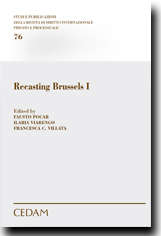Book: Pocar – Viarengo – Villata (Eds.), Recasting Brussels I
 The Italian publishing house CEDAM has published a new volume on the review of the Brussels I regulation: “Recasting Brussels I“. The book, edited by Fausto Pocar, Ilaria Viarengo and Francesca Clara Villata (all from the Univ. of Milan) includes twenty-five papers divided into five parts, devoted to the scope of application (I), rules on jurisdiction (II), choice-of-court agreements (III), coordination of proceedings (IV) and recognition and enforcement of judgments (V).
The Italian publishing house CEDAM has published a new volume on the review of the Brussels I regulation: “Recasting Brussels I“. The book, edited by Fausto Pocar, Ilaria Viarengo and Francesca Clara Villata (all from the Univ. of Milan) includes twenty-five papers divided into five parts, devoted to the scope of application (I), rules on jurisdiction (II), choice-of-court agreements (III), coordination of proceedings (IV) and recognition and enforcement of judgments (V).
Here’s the table of contents (.pdf file):
PART I – SCOPE OF APPLICATION
- Rainer Hausmann, The Scope of Application of the Brussels I Regulation;
- Ilaria Viarengo, The Removal of Maintenance Obligations from the Scope of Brussels I;
- Claudio Consolo – Marcello Stella, Brussels I Regulation Amendment Proposals and Arbitration;
- Peter Kindler, Torpedo Actions and the Interface between Brussels I and International Commercial Arbitration;
- Stefano Azzali – Michela De Santis, Impact of the Commission’s Proposal to Revise Brussels I Regulation on Arbitration Proceedings Administered by the Chamber of Arbitration of Milan.
PART II – RULES ON JURISDICTION
- Burkhard Hess, The Proposed Recast of the Brussels I Regulation: Rules on Jurisdiction;
- Riccardo Luzzatto, On the Proposed Application of Jurisdictional Criteria of Brussels I Regulation to Non-Domiciled Defendants;
- Fausto Pocar, A Partial Recast: Has the Lugano Convention Been Forgotten?;
- Alexander R. Markus, Harmonisation of the EU Rules of Jurisdiction Regarding Defendants Outside the EU. What About the Lugano Countries?;
- Ruggiero Cafari Panico, Forum necessitatis. Judicial Discretion in the Exercise of Jurisdiction;
- Marco Ricolfi, The Recasting of Brussels I Regulation from an Intellectual Property Lawyer’s Perspective;
- Eva Lein, Jurisdiction and Applicable Law in Cross-Border Mass Litigation;
- Zeno Crespi Reghizzi, A New Special Forum for Disputes Concerning Rights in Rem over Movable Assets: Some Remarks on Article 5(3) of the Commission’s Proposal.
PART III – CHOICE-OF-COURT AGREEMENTS
- Ilaria Queirolo, Prorogation of Jurisdiction in the Proposal for a Recast of the Brussels I Regulation;
- Christian Kohler, Agreements Conferring Jurisdiction on Courts of Third States;
- Francesca C. Villata, Choice-of-Court Agreements in Favour of Third States’ Jurisdiction in Light of the Suggestions by Members of the European Parliament.
PART IV – COORDINATION OF PROCEEDINGS
- Luigi Fumagalli, Lis Alibi Pendens. The Rules on Parallel Proceedings in the Reform of the Brussels I Regulation;
- Pietro Franzina, Successive Proceedings over the Same Cause of Action: A Plea for a New Rule on Dismissals for Lack of Jurisdiction;
- Lidia Sandrini, Coordination of Substantive and Interim Proceedings;
- Cristina M. Mariottini, The Proposed Recast of the Brussels I Regulation and Forum Non Conveniens in the European Union Judicial Area.
PART V – RECOGNITION AND ENFORCEMENT OF JUDGMENTS
- Sergio M. Carbone, What About the Recognition of Third States’ Foreign Judgments?;
- Thomas Pfeiffer, Recast of the Brussels I Regulation: The abolition of Exequatur;
- Stefania Bariatti, Recognition and Enforcement in the EU of Judicial Decisions Rendered upon Class Actions: The Case of U.S. and Dutch Judgments and Settlements;
- Manlio Frigo, Recognition and Enforcement of Judgments on Matters Relating to Personality Rights and the Recast Proposal of the Brussels I Regulation;
- Marco De Cristofaro, The Abolition of Exequatur Proceedings: Speeding up the Free Movement of Judgments while Preserving the Rights of the Defense.
– – –
Title: Recasting Brussels I, edited by F. Pocar, I. Viarengo and F.C. Villata, CEDAM (Series: Studi e pubblicazioni della Rivista di diritto internazionale privato e processuale – Volume 76), Padova, 2012, XXIV – 382 pages.
ISBN 9788813314699. Price: EUR 32,50. Available at CEDAM.
(Many thanks to Prof. Francesca Villata for the tip-off)
 In two judgments of June 7th, 2012, the French Supreme Court for private and criminal matters (Cour de cassation) ruled that foreign judgments allowing adoption by a same sex couple were contrary to French public policy.
In two judgments of June 7th, 2012, the French Supreme Court for private and criminal matters (Cour de cassation) ruled that foreign judgments allowing adoption by a same sex couple were contrary to French public policy. The second issue of the International and Comparative Law Quarterly for 2012 includes three articles exploring choice of law issues.
The second issue of the International and Comparative Law Quarterly for 2012 includes three articles exploring choice of law issues. A recent book comparing French and Brazilian laws (
A recent book comparing French and Brazilian laws (